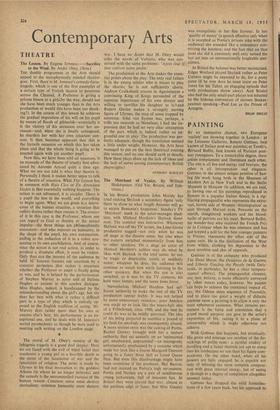Contemporary Arts
THEATRE
The Lesson. By Eugene lonesco.—Saerifice to the Wind. By Andrd Obey. (Arts.) Tim double programme at the Arts should appeal to the metaphysically minded theatre- goer. First, there is M. lonesco's comedy-farce- tragedy, which is one of the first examples of a certain type of French theatre to penetrate across the Channel. A Professor is giving a private lesson to a girl.(by the way, should not she have been much younger than in the Arts production or would this have been too shock- ing?). In the course of this lesson he achieves the gradual imposition of his will on his pupil by means of floods of gibberish—essentially it is the victory of his unreason over her un- reason—and, when she is finally subjugated, he murders her with her own reluctant con- sent. It then becomes apparent that this is the fortieth occasion on which this has taken place and that the whole thing is going to be enacted again with yet another pupil.
Now this, we have been told ad nauseam, is an example of the theatre of cruelty first advo- cated by Antonin Artaud quite a time ago. What we are not told is what that theatre is. Personally I think it makes better sense to talk of a theatre of :situation. What The Lesson has in common with Huis Clos or En Attendant Godot is that essentially nothing happens. The action is not advanced; it is circular. There is a pupil the less in the world, and is to begin again. What we are given s a micro- cosm of the human situation, a situation that suffers drama rather than creates it. The creator of it in this case is the Professor, whom one can regard as God or destiny or the sexual impulse—the three things are philosophically consonant—and who imposes on humanity, in the shape of the pupil, his own automatism, ending in the reduction of it to a robot con- senting to its own annihilation. And, of course, since the action is not real action, in order to produce a dramatic effect, it must be violent. Only thus can the interest of the audience be held. M. loncsco focuses our attention by a constant peripetcia that makes it uncertain whether the Professor or pupil is finally going to win, and he is helped by the performances of Stephen Murray as actor and of Helena Hughes as patient in this sombre dialogue. Miss Hughes, indeed, is handicapped by the misunderstanding about the girl's age, but she does her best with what is rather a difficult part in a type of 'play which is entirely op- posed to the English tradition of acting. Mr. Murray does rather more than his own or anyone 'else's best; his performance is an ex- ceptional one, and he deals with M. loncsco's verbal pyrotechnics as though he were used to meeting such writing on the London stage.
The moral of M. Obey's version of the Iphigenia tragedy is a good deal simpler. Here we are faced with the evil of blind belief that condemns a young girl to a horrible death in the name of the fanaticism of war and the fanaticism of religion. The point is made by Ulysses in his final invocation to the goddess Athena (in whom he no longer believes), and the remedy is the untrammelled exercise of the human reason. Common sense must destroy clericalism; common humanity must destroy war. I have no doubt that M. Obey would echo the words of Voltaire, who was con- cerned with the same problems: ',Ores tout ib foot cultiver noire jardin.'
The production at the Arts makes the essen- tial points about the play. The only real failure is in the young soldier who is meant to play the chorus; he is not sufficiently choric. Andrew Cruikshank creates in Agamemnon a convincing King of Kings persuaded of the supreme importance of his own destiny and willing to sacrifice his daughter to it,i and Rupert Davies makes 'a strangely moving figure of Ulysses, the man of sense trapped by nonsense. John van Eyssen was, perhaps, a trifle too neurotic as Menelaus; I had the im- pression that he had no very clear conception of the part, which is, indeed, rather an un- grateful one to play. The production was per- fectly adequate, though the translation seemed a little under weight. However, the Arts have managed to put on the best theatrical evening this season, and no one should cavil at details. How these plays show up the lack of ideas and the lack of nerve among contemporary British playwrights!
ANTHONY HARTLEY










































 Previous page
Previous page